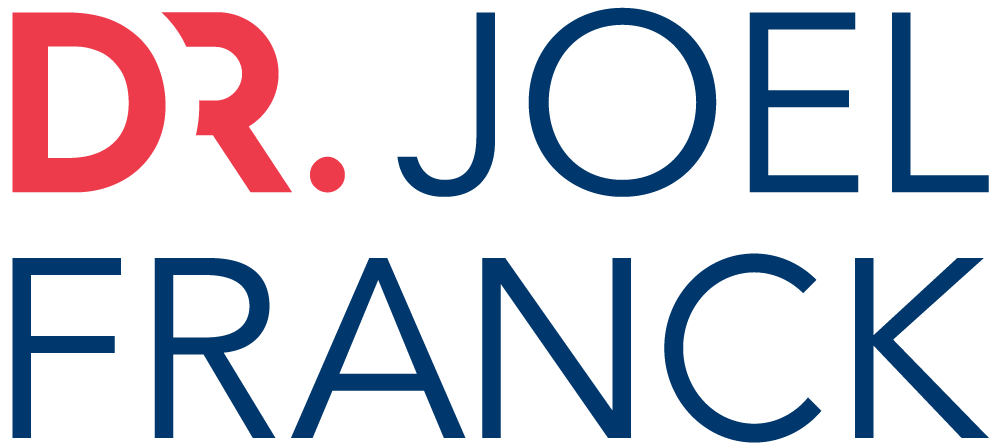The Neck Surgery Specialist That Will Change Your Life.
Introducing Cervical Fusion
Dr. Joel Franck specializes in a neck surgery known as ‘cervical fusion’ and has developed and performs an innovative, highly effective method for C1-C2 fusion. He has performed hundreds of highly successful such cases.
Dr. Franck is also a renowned expert in the treatment of herniated cervical discs in the lower cervical spine, having performed thousands of anterior cervical fusions for these patients. These techniques require only a brief recovery at the surgery center, followed by a comfortable stay at a premium hotel with up to 23-hour nursing care immediately after the procedure.
"Get your Life Back.
Stop Suffering, Start Living."
“My team and I take great pride in helping patients get their life back. I have studied thousands of cases and treated hundreds from all over the world using my technique. It’s an amazing feeling when my patients come back to see me in my office and cry with joy for giving them their life back. If you think you qualify for this surgery, the time is now to stop suffering”.
Do I Qualify for C1 C2 Fusion Surgery?
When someone’s neck gets injured, whether from a car accident, slip and fall, or sports-related incident, it triggers various bodily responses. Physicians often identify these injuries as “Whiplash Associated Disorder,” indicating harm to the neck. Given that head and neck injuries often occur simultaneously, resulting symptoms are termed “Cranial Cervical Syndrome.” If you’re experiencing these symptoms, cervical fusion or craniocervical instability surgery may offer a viable solution to alleviate intractable headaches and cervical instability.
Review the checklist to see if you qualify Neck Surgery:
- Headaches, confusion, work/school issues due to neck trauma-related symptoms.
- Severe neck pain, shoulder blade pain.
- Arm/leg pain, weakness from neck.
- Weak arms, coordination, fine motor problems, dropping objects.
- Leg weakness, balance, falling.
- Bladder issues, sexual dysfunction.
- Vision changes, facial weakness, numbness.
- Swallowing problems, gastric emptying syndrome.
- Night jerking movements, mistaken for seizure/epilepsy.
- Autonomic issues: tachycardia, sweating, hypotension.
- Depression, insomnia, anxiety, disrupted relationships from these symptoms.
Patient Testimonials
Real patients whose lives were changed by surgery.






Pre & Post-Care Prep
Steps to a New You
Preparing for Your Surgery Journey
Pre-operative Visit: Dr. Franck’s office will arrange for your pre-operative visit and evaluation and instruct you on the specifics of your surgical procedure.
Imaging:
Digital Motion Xray (DMX): A pre-operative Cervical DMX – which is a video-fluoroscopy of your neck in motion – is essential for the pre-operative analysis. Dr. Franck’s office can assist you in scheduling.
Upright Cervical Positional MRI: This study is essential for surgical analysis, and should be done within four months. If needed, an updated scan can be arranged by our office locally in Tampa, FL.
Surgical Recommendations: Upon evaluating your injury and complaints and reviewing your imaging studies, Dr. Franck may recommend that, in addition to the C1-C2 posterior fusion, you may benefit from surgery for herniated cervical discs. Often, these can be combined into one procedure.
Medication Instructions: It’s vital to avoid blood-thinning medications like aspirin, Aleve, Motrin, Ibuprofen, Goody Powders, etc., two weeks before surgery. If you’re on Plavix, Xarelto, or aspirin prescribed by your Internist or Cardiologist, consult your physician about the safest timing to temporarily discontinue the medication.
Preparation for Your Visit:
Duration: Your initial comprehensive evaluation at the office will last between one and one-half and three hours.
In certain circumstances, a preliminary detailed evaluation may be performed via a Telemedicine consult. It will also last for a similar amount of time and will be followed up by an in-person pre-operative office appointment.
Companion: Bringing a close friend or relative is advised.
During the Visit: During the visit, Dr. Franck will delve into your medical history, perform a thorough physical exam, and meticulously review your imaging studies with you and develop a surgery plan.
Navigating Your C1-C2 Surgical Procedure
Anesthesia and Positioning: During surgery, you will receive general anesthesia, which will be closely monitored for your safety by a certified MD anesthesiologist. With meticulous care, you will be positioned face down on the operating table using advanced image-guided technology.
Incision and Access: A small incision below your skull will grant access to the top of your cervical spine.
Fusion and Adjustment: Using advanced image-guided precision, two 4mm diameter titanium screws will be cautiously guided to connect C1 and C2. Bone fusion material will be directly applied to these vertebrae. If necessary, a 2 cm² section of bone from the occipital skull base will be removed to alleviate pressure on the brainstem base, as identified in the upright MRI.
Duration and Communication: The procedure will typically last approximately two to four hours. Through surgery, Dr. Franck and his team will maintain communication with your family to provide timely updates on progress.
Recovery and Follow-Up
Cervical Collar and Initial Recovery:
- You’ll wear a cervical collar for six weeks to ensure stability.
- After a brief recovery period in the post-anesthesia care unit, you’ll be discharged to a Premium hotel with around-the-clock nursing care.
- Post-op pain medication prescriptions will be provided on the surgery day.
- While you can resume most normal activities once home, avoid heavy lifting, climbing, crawling, and overhead tasks.
- Refrain from driving for six weeks due to the hard cervical collar.
Post-Op Check-Ins:
- You will have check-ins on Day 1 and at two and a half weeks after the surgery.
- Subsequent visits will involve cervical x-rays at six weeks, six months, and one year.
- It is essential to remain in the vicinity for two and a half weeks post-surgery.
- Notably, this locale boasts stunning beaches, great restaurants, and fascinating museums, making it an ideal world-class vacation spot for both recovery and family enjoyment.

